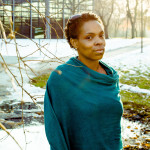Interview by Jake Malooley
Photos by Jeffrey Marini
My earliest tennis memory is of my dad bringing me to a court not far from our house in Hyde Park. I was maybe three. He had already introduced my older brother, Hugh, to the game. Mom and dad don’t play, but they were inspired by the success story of Venus and Serena Williams, and their father, who showed them the game when they were really young.
When I was six, I was at Midtown Athletic Club in Lincoln Park for a tournament. It’s the first time I remember watching Serena on TV, and I thought, Wow, I want to be just like her. It wasn’t like, Oh, it’s easier to relate to her because she’s black or something. I just thought she was good.
I want to be better than [the Williams sisters], actually. I want to go professional, and my biggest goal is to be number one in the world.
Being a junior tennis player in Illinois, most of the tournaments happen in the suburbs, the North Shore and beyond. Some of my friends from the neighborhood probably don’t know where places like Hinsdale or Winnetka are. I’m often the only African-American at some of these tennis clubs. I notice, but I try not to focus on it. It could become a distraction, so I just play my matches. I haven’t been discriminated against—at least nothing that I can point to. But the more kids on the south side who get to play tennis at places like XS, we will see tournaments start to diversify.
I’ve gotten to meet Donald Young, who grew up playing tennis in Hyde Park before turning pro. It’s good to talk to him because he came from the same place as me, he knows the struggles and what it takes to break through. He told me, “Just keep playing.”
If tennis doesn’t work out, I want to be a chemist. Or some kind of scientist. Science is my favorite subject. I want to wear a white lab coat and work with test tubes. That could be fun. Probably less competition than tennis.
Tennis is important, clearly. I’m putting a lot of myself into it. But my education is more important. I go to Saint Thomas the Apostle School in Hyde Park. I make straight As, and that’s thanks to some of the things I learn on the tennis court that apply off of it. When I’m nervous, I have to remember to play my game; if a shot isn’t working, go to another. It’s similar if I’m taking a math test: if I’m nervous, I do what I know instead of feeling defeated by what I don’t.
When I was down in Florida for an American Tennis Association camp for the top-ranked black junior players, I got this bracelet that says MENTAL TOUGHNESS. A good reminder.
“I’m often the only African-American at some of these tennis clubs. I notice, but I try not to focus on it.”
Tennis is a very emotional sport, and you learn to deal with your emotions. I definitely do less crying than I used to. During a tough match, I don’t throw my racket or anything. I’ve heard girls who are my age scream the F-word. You get penalized for stuff like that. I get pretty fiery too, but I’ll just pump my fist and yell “Come on!” Sometimes I’ll take it out on my coach: “You’re sitting there on the sideline like nothing’s happening?!” Or usually I’ll just say it in my head. It’s that competitive spirit, that desire coming out. It’s fire.
Every great tennis player has a rival, and mine is Sydni Ratliff, who is from Ohio. Those matches are . . . intense. Even the refs will say, “That was good tennis.” But off the court, we’re best friends. We have a shared Instagram account, which is mostly just pictures of us we’ve taken.
In June, I was in a final against Sydni. I had, like, eight match points and just couldn’t close it out. After a loss like that, food is my comfort. First we went to Dunkin’ Donuts for a strawberry frosted doughnut and a strawberry Coolatta. And then we went to Red Robin, and I got a cheeseburger. It helps.
When I hang out with the girls who I play against, we don’t talk about going pro or anything. Off the court, it’s kid stuff. Because we’re on the road a lot, girls have birthday parties at, like, a fast-food restaurant or the hotel swimming pool or the town’s only bowling alley.
Sometimes trips to tournaments double as family vacations, especially if I’m playing in Florida or California. When I’m not playing, we’ll go to the beach or out to dinner or hang out in the hotel. When we all went to Austin for a tournament, we ended up watching the bats fly out from underneath the Congress Avenue Bridge. It’s easier to throw myself into tennis if the whole family is on board.
We have a family trophy ceremony whenever I win. My mom pretends to be the announcer: “And now, here’s Tyra Richardson!” I come down the hall and my dad and brother cheer like wild fans. My mom asks, like, “Tyra, how did you manage to win?” Then I pick a spot in the trophy case. Every once in awhile I’ll go back for a peek. It’s a reminder during a hard day what I’ve managed to accomplish already and that I can keep going. v



![[photograph of Bella Roy and Charlie Roy]](https://people.chicagoreader.com/wp-content/uploads/2016/12/iamchicago-CHARLIE-ROY-BELLA-ROY-150x150.jpg)
